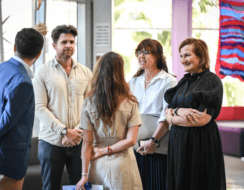04 Apr 2016
NewsSSI and Metro Assist support newly arrived refugees
Hosted by Metro Assist in partnership with Settlement Services International (SSI), the forum aimed to improve service providers’ understanding of issues affecting refugees in Australia and to create a cooperative response to challenges such as English language barriers, health and family matters and education.
Speaking to an audience of some 100 community service practitioners, SSI CEO Violet Roumeliotis said the challenges refugees face often continue when they arrive in Australia.
“We are constantly looking for new initiatives to increase the value we offer to the vulnerable people we serve, she said. But our end goal is not to deliver services alone – it is to support individuals to find their way in Australia, to be the best they can be, and to help them shine,” she said.
“I firmly believe that working together to connect refugees and asylum seekers with the services they need and make community connections, helps to empower them to reach their full potential so they can live independently and lead happy, meaningful lives.”
Metro Assist CEO, and SSI Board Member, Lou Bacchiella said creating best practice services in this area was critical, because settlement doesn’t happen automatically for refugees.
“For some, personal resilience can see them land on their feet relatively fast, but for others, settlement can take a very long time, and in some cases, the pain of their experience never really leaves them,” he said.
Also speaking at the event, NSW Coordinator-General for Refugee Resettlement Professor Peter Shergold said the Federal Government’s commitment to accept an additional intake of refugees from the Syria and Iraq conflicts provided an opportunity to reflect on what does and doesn’t work well with existing settlement services, and identify any gaps.
“It’s not going to happen overnight but we can start a process now over these next two years of really having the world’s best practice in terms of refugee resettlement,” he said.
This, however, will require the corporate and public sectors to coordinate their efforts with community organisations, and individuals and families, Professor Shergold said.
“Much of this doesn’t require an extra bucket of money,” he said. “It requires imagination, it requires effort, it requires commitment, and it requires emotional intelligence.”
One such cooperative effort is a fund Western Sydney University (UWS) established last year to provide education scholarships for refugees and fee waivers for people on bridging visas.
Professor Shergold, who is the university’s chancellor, said the $500,000 that UWS set aside for the fund had now grown to $1.2 million through the generous support of businesses and the broader community.


